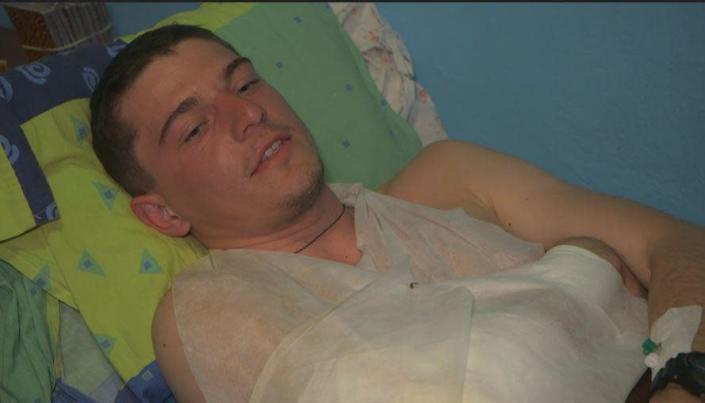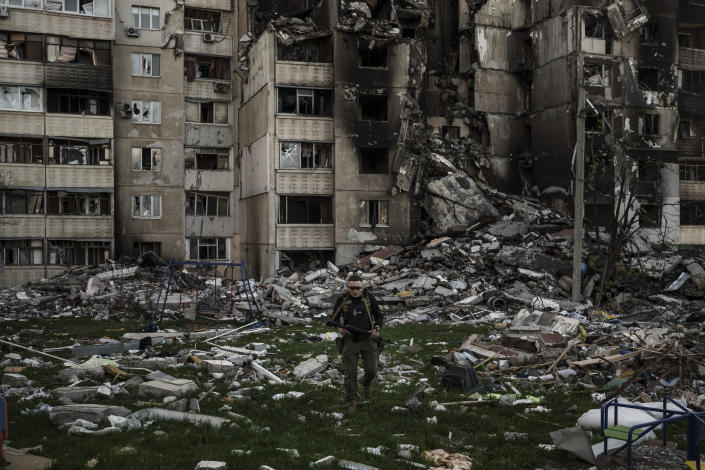Zaporizhzhia, Ukraine — Russia’s Foreign Minister said Tuesday that if the U.S. and Ukraine‘s other Western allies continue to arm the country as it battles Moscow’s invading forces, the risk of the war escalating into a nuclear conflict “should not be underestimated.” In an interview with Russian TV, Sergey Lavrov said that by providing weapons, NATO nations were “pouring oil on the fire” and risking “World War III.”
He said the ongoing arms shipments to Ukraine meant NATO was “in essence engaged in war with Russia” already.
The veteran Kremlin diplomat issued his latest warning as U.S. Secretary of Defense Lloyd Austin met in Germany with NATO allies, urging European nations to increase their military aid to Ukraine. Germany’s defense chief announced Tuesday that the country would start sending self-propelled armored anti-aircraft guns to Ukraine.
U.N. chief to meet Putin in Moscow, push for ceasefire
Foreign solidarity with Ukraine has only grown over the course of Putin’s unprovoked two-month assault, now focused largely on Ukraine’s east. It continues to claim innocent civilian lives, despite Russian officials’ insistence that they’re only hitting military infrastructure.


Overnight, the Defense Ministry in Moscow said it had hit about 90 more “military” targets in Ukraine, including rail facilities around the battered northeast city of Kharkiv that are vital to Ukrainian supply chains — including the ingress of foreign weapons.
Despite Russia’s overwhelming firepower advantage, Austin said before his meeting at Ramstein Air Base in Germany that Ukraine could win the war, if it has the “right equipment.”
Ukraine’s Foreign Minister Dmytro Kuleba dismissed Lavrov’s remarks about nuclear war as an indication that Moscow already “senses defeat in Ukraine.”
But in Ukraine’s east, the fight is far from over. As CBS News senior foreign correspondent Charlie D’Agata reports, there has been no rest for the remaining residents, or the firefighters in Kharkiv. Russia said its latest strikes killed 500 Ukrainian troops. That can’t be independently verified, but it is clear the front-line fighting has intensified.
Ukraine’s second largest city had been among the hardest hit this week as Russia increases its onslaught along a 300-mile front line in the east.


Some of those who’ve escaped the fighting have taken shelter in a shopping center in the city of Zaporizhzhia. The realities of a country at war could not be more stark: You can buy fabric softener in one aisle, see a refugee tent in the parking lot and a café that’s been converted into a makeshift first-aid center.
D’Agata met Fedor Zubkov, 36, at the mall, taking shelter after losing his wife to Russian shelling.
“We started dating when we were 15 years old,” he said. “She was my first love.”
Zubkov is struggling to cope mentally. He said his town near Zaporizhzhia was attacked on the first day of Russia’s war, and the invaders quickly quashed its defenses.
“Over two days, they killed all those in the territorial defense unit and they destroyed the city center,” he told CBS News. “The missile killed my wife together with her younger sister. I was told to go to the hospital and then people told me, ‘You don’t need to go now.’ I asked, ‘What do you mean?’ They told me she was dead. I couldn’t even bury her. Corpses were lying on the streets of our city for two days and Russians didn’t let us bury them.”


He said Russian-allied forces held him captive for two days, “handcuffed, and they were pointing the gun at me and said: ‘We’ll shoot you now!’ I told them, ‘You killed my wife,’ and they replied: ‘It’s not us, it’s Ukraine.’ They killed the mother of my single child.”
Zubkov’s 18-year-old daughter, whose college studies in Kyiv were derailed by the war, now wants to move to the U.S. Zubkov said he doesn’t even know how she’s coping with the loss of her mother. He is not.
“I need to see the psychiatrist, because after the imprisonment and the loss of my beloved wife, I am slowly losing my mind,” he told D’Agata. “You can’t even imagine what it is like to be tortured, when 30 fully armored Chechen men stand in front of you, point the gun at you and threaten to kill you again and again.”
D’Agata and his team visited a military hospital near the shopping center, where they met Nazik Hnativ. After volunteering to fight when the war broke out, the 27-year-old radio host from the western city of Lviv found himself right in the middle of the most brutal fighting in the east.
On Saturday, an artillery round tore through both of his legs and an arm.
“I thought I lost my leg and wouldn’t be able to play soccer,” he said. “The first thing I asked was whether I could play soccer — and fight again.”
D’Agata asked him through a translator if he really wanted to return to the front lines after being so badly wounded.
“Of course, of course,” he said. “It is my land. It is my country. It’s my motherland.”


Asked whether he had told his mother that he’d been hit, he said not yet. He didn’t want to worry her.
“I called her this morning from the nurse’s phone, because I know the phone number of my mom by heart. I told her that I hadn’t called her for so long because I lost my phone, because I broke it, so my parents do not know what happened to me,” he told CBS News “My mom is very sensitive, and if she heard that something happened to me, she would make it from Lviv to Zaporizhzhia, to here, in three minutes in order to see me.”
Hnativ admitted that it was “scary” to find himself facing Russia’s military might without any military experience or real training.
“I am not saying that I am fearless. I am also afraid, and I have never wanted to fight in a war. But Russians invaded my land, they came to kill my brothers and sisters, my fellow Ukrainians here. They came to kill my nation,” he said. “I didn’t know how to fight. Never ever had I held a weapon in my hands before February 24th. But when the war started, I realized and I decided that I need to be on the battlefield and I need to protect my country.”
D’Agata asked the wounded soldier if he had a message for Russia. We can’t reprint it, but he told them to leave Ukraine, and he didn’t mince his words.
Hnativ also had a message for the United States: “Help us! Send us weapons! And we will win.”
MoneyWatch: Inflation and retirement planning




